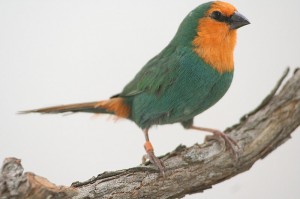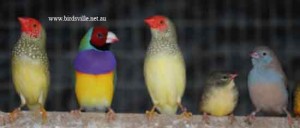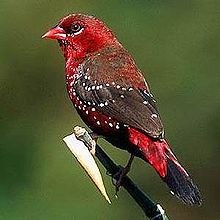How to look after new finches
For more in depth information of your particular bird scroll through this website and click on your actual bird.

Finch arrival at a new home
After acquiring your new finches go straight home to minimize stress on the birds. Before placing finches in the cage or aviary make sure that it all is set up first. Place all perches, feed, water in the cage, then place the new birds into their new environment.
Do not place new birds in with existing birds for 2 weeks. Place the new birds in a cage inside or next to the cage or aviary you plan to introduce them too, as new birds can be attacked if resident birds are not used to them. Give your new finches 5 days to adjust to there surroundings before spending too much time moving things around in their enclosure.
It is important to add sulfa 3 or Sulphadim a mild antibiotic into the water for the first 5 days of any finch that has been introduced into a new cage or aviary. This will reduce stress and stop then from getting diarrhoea as this can cause your birds to get the runs and very quickly kill a fragile finch.
Female Finches – Be careful with new female finches as they can be chased by over zealous resident males which can be too much for a newly arrived bird to handle and can easily over stress them which can cause sudden death. This is one reason why you should place your newly arrived hens in a cage in view of the male birds so they can get used to each other, this is called soft releasing.
Diet
for detailed diet information on your specific species of finch find the page within this website
Diet is very important for keeping finches, as everything you feed them is only a substitute for what they would feed themselves in the wild. A finch in its natural environment will be able to self medicate itself for what it needs and supplement itself with various food sources, vitamins and minerals. This is why it is important that you offer a varied diet to enable your finches to supplement the diet accordingly.
Seed- Feed a good quality seed mix. Almost all finches have evolved to feed on one thing – grass seed’s. This is why majority of the seed mix contains millet seed and canary seed. Because seed is the basis of their diet it is important to provide a good quality seed mix. Many people are of the belief that all seed mixes are the same, but this couldn’t be further from the truth. Seed mix quality changes enormously, depending on where it comes from, how fresh the seed is and what types of seeds or fillers are used to make up the mixture. When I first started breeding finches I set up the aviary with some lovely pairs of Gouldian finches. They tried to breed but I had very little success with the young surviving. I couldn’t understand why, as I had done everything else correctly. I spoke to a bird breeder (at the time I was about 10 years old) and he asked me where I bought the seed from. I told him I was purchasing the mix from my local super market, it looked nice, clean and neatly packaged. He suggested I change the seed mix! I thought that was odd, but I took his advice, as I tried everything else. The rest is history and from the success I have had with my birds since, I have been hooked on finches for the past 20 years ever since. Seed quality is very important for the health and vitality of all birds, this is why I constantly stress at Birdsville about this subject, as still so many people feed there birds a low grade seed mix and their birds suffer. Many pet shops and produce stores supply good quality seed mix and I urge my customers to buy quality.
A list of good foods and feeding tips for finches
- Sprouted seeds – Place some of the seed mix in a container fill with water until they swell up for 24 hours, during this process rinse the seeds through a sieve twice a day. When the seeds have just started to sprout they are ready to feed to the birds. Remember to clean the seeds thoroughly with aviclens before feeding to the birds.
- Egg and biscuit – This is an important source of protein for finches especially when breeding. Egg and biscuit is sold at Birdsville from a number of different manufacturers such as, Passwell, Sheps, Avione and Vetafarm. I have all used all these products and the finches seem to enjoy all of them. I guess its preference as I have noticed that different hobby breeders prefer different products.
- Calcium – Essential for finches especially the hen when she is breeding. We use Calcigrit, which I believe is the ideal calcium supplement for finches because it has a mixture of fine egg shell, crushed cuttle bone, lime stone, charcoal and fine sea shells which is comes in a form which is palatable for tiny finches to consume. This mix should always be available.
- Vitamins – essential vitamins should be added to the water which is a multi-vitamin for birds. Vitamin in the seed is a waste, as finches for example only eat the inside of a millet seed and discard the shell, this is why they must be added into the water which will add to the health and vitality of your finches. Do not feed birds uncooked egg shells this can make them ill.
- Live food – Almost all finches will eat live food and especially when they are breeding, which is important for the development of the young. Live food is usually supplied in the form of meal worms and fly pupae. Live food is an important form of protein and fats.
- Greens – Seeding grasses, which are a favourite for almost all finches, however be wary of grass that has been sprayed with pesticides, as this can easily kill a finch if consumed. Other greens such as endives, chickweed, dandelion, silverbeet and kale are good. Always rinse before feeding birds.
- Fresh water – the essence of life always make sure they have fresh clean water. If water is not kept fresh and clean your birds can become sick and as a consequence die.
- Fruit – visit your finch species page as not all finches will eat fruit.

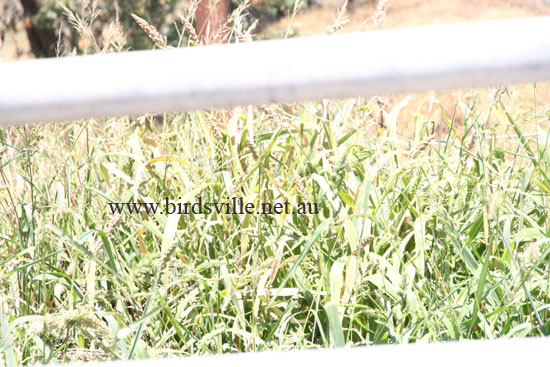
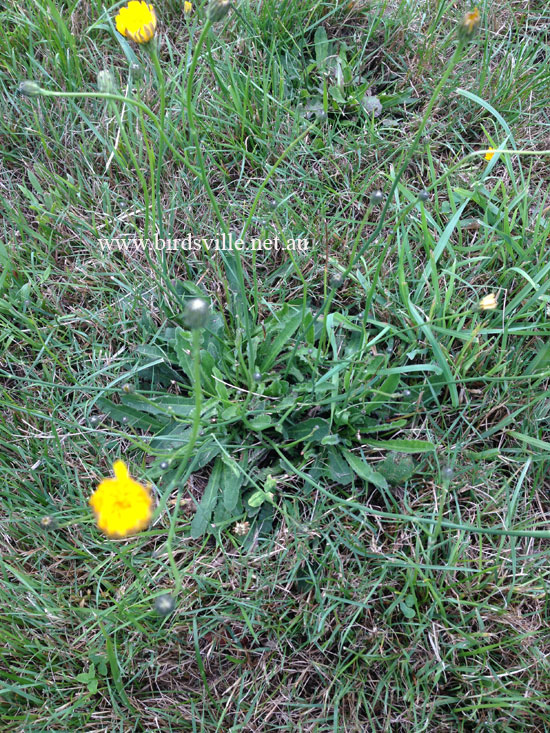
Important tips Keeping finches Healthy
- Worm every 3 months for outdoor birds and every 6 months for indoor birds,
- Spray birds, nests and living quarters with mite and lice spray every 3 months
- medicate your birds with sulfa 3 or sulfadim every 2 months for 3 days
- Medicate your birds with sulfa 3 or sulfadim during and after heavy rain
Housing dangers and care guidelines for finches
- Poisoning – take care of poisons, chemicals, cleansers, paints etc.
- Empty containers – falling in and suffocating.
- Threads of string or wire – getting there feet caught could result in death.
- Excited children – Finches can be killed with love, as happy kids playing with them too long especially, if the finch is not use to the new environment can result in stress and then death.
- Spikes in aviary or cage – can result in injury.
- Open toilets or bodies of water. If they fall in they can drown.
- Predators such as snakes, rats, and butcher birds – these will eat your birds, so cover the majority of the cage if it is left outside, so finches have protection.
- Cold – keep finches away from drafts, supply heating or covers for finches kept in cold climates or winter. If a finch gets a chill it can easily become sick and die. Different species are more tolerant of cold than others.
- Moving finches – This can be very stressful and cause finches to be get the runs/diarrhea, which in some cases can lead to illness. So if you purchase or move finches it is recommended to dose them with sulfa 3 or Sulphadim, which is a very mild antibiotic and stops finches from getting the runs. This goes in the drink and should be supplied 5 days after moving to a new cage and location.
- Viruses, pathogens and bacteria – clean cage or aviary with bird friendly disinfectant, which is available at Birdsville
- Windows – becoming stuck and eventually death occurs
- Flying away
- Candles – getting burnt
- Hard floors – Birds that are not expert flyers landing on the ground and bruising there chest which can quickly result in sickness and death.
Weekly – give a thorough cleaning to the cage or aviary.
Daily – supply with fresh water and seed in clean containers.
Monthly – check aviary for holes, rat holes.
Monthly – clean or replace branches, clean out nesting boxes after young have left the nest.
Note please: every 3 to 6 months worm your birds.
Is my finch sick?
For the untrained eye it can be difficult to tell if your bird is sick or not.
- Has the bird got a dirty vent/messy feathers around the vent.
- Is the bird fluffed up?
- Is the bird sitting still and not moving or active, less than normal?
- Are the legs clean and straight?
- Has the bird got discharge coming from the eye’s
- Muscle mass around the birds keel, if the bird is thin and its keel sticks out with no muscle mass or meat on either side your bird is more than likely to be sick
If you answer yes to any these then there is something wrong with your bird, please read the following.
The first thing you must do immediately is remove the sick bird from the general population and place them in a small cage with heating. This can come from a heater or reading light. Ive found reading lights to be perfect propped up close to a cage be-wary of anything burning as globes can be quite hot. Warmth is essential of your sick bird has a chance of survival. A towel over the cage IS NOT WARM. The most common reason a finch becomes sick is because they have picked up an illness such as bacteria which can happen very quickly, although there is a plethora of reasons why any animal can become sick such as other birds bullying a new arrival, stress, etc. Just like humans sometimes you can do everything right it can be an act of god. The bird must be supplied with medication which is placed in the drinking water. Birdsville sells a number of antibiotics, which are very effective in treating finches. This is an ideal “first line” of attack where a definite diagnosis is not available. At Birdsville we stock a broad-spectrum antibiotic powder for use in ornamental birds for bacterial infections including E.coli (Enteritis), Mycoplasma (Chronic Respiratory Disease) and Chlamydia (Psittacosis). If the birds fail to respond to the treatment within 3 days veterinary advice should be obtained.
Finches are very delicate, anyone who has experience with these birds will verify this. A human from the point of being in contact with a cold will start to show symptoms within 24 hours, so imagine a finch which has a higher body temperature than a human a much faster metabolism and a heart rate of around 70 beats per second these birds can become ill very quickly so always keep a close eye on your birds.
The best defence in not letting your birds become ill by minimising stress, giving them a full well rounded diet, worming your birds and a good quality seed mix
Finch Compatability with other birds.
Finches generally should not be housed with large parrots unless they are in a giant aviary where this can be made possible as some zoo’s have done. Note that the more mixed a collection is the greater risk of finches of contracting viruses. Quails whilst being terrestrial are prone to night fright as they get spooked they jump usually hitting the roof of the aviary and all the inhabitants become spooked as well this can cause stress and even death in birds as they can easily break there neck.
Parrots that finches can be housed with
Bourke’s parrot – Neophema bourkii, Turquoise parrot – Neophema, Scarlet chested parrot – Neophema splendida,
Doves that finches can be housed with
Masked doves, Diamond doves, Peaceful doves, Talpicoti doves
Lorikeets that finches can be housed with
Little lorikeets, Purple crowned lorikeets, Varied lorikeets
Finch Compatability with other finches.
There is always an exception to every rule but as a guideline for your birds this may help.
Finches that vary in personality and can be a bit of ying and yang as in mildly aggressive are…
Cuban finches, Cut-throat finches, Zebra finches, Bengalese finch, Parson finch, Red browed finch, Chestnut breasted mannikin.
Finches that sometimes have a bad attitude towards other finches are…
Jave finches, Madagascar weaver, and Crimson Finch
Finches that often do well colony bred with there own kind
Java finches, Gouldian finches, Parrot finches, Plum headed finches, Grenadier weaver, Red browed finches, Star finches, Cut throat finches, Zebra finches, Painted firetails, Diamond firetails
Mixing birds for bigginners or ideas for veterans
No matter if your new to the hobby or have had finches over the years, I get many people ask me what birds are good to mix together and as a bit of a naturalist I always say to people to keep a theme, e.i. birds from one country in one aviary. Such as birds from australia such as, Gouldians, Star Finches, Long tails, Double bars, Blue face parrot finches, Plum-headed finches and Masked finches, or birds from Africa such as Ruddies, Red cheeked cordons, Aurora finches, Orange breasted, and Saint helena finches
This Video is ok but a little bit misleading with the dietary requirements as the seed mix shown is supposed to have vitamins in it but this as useless as tits on a bull as finches shell there seed and therefor they will not have a chance to ingest any of the vitamins. Vitamins should be given as a supplement in the water. Seed cones are also not very useful for finches as they have difficulty removing the seeds from the glue used to stick them together. Instead use millet sprays much healthier and more nutritious for your bird.
